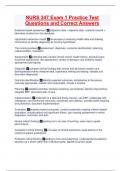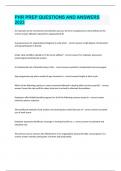NURS 347 Exam 1 Practice Test
Questions and Correct Answers
Evidence based assessment ✅subjective data + objective data + patient's record +
laboratory studies form the database
Hypothetico-deductive model ✅the process of analyzing health data and drawing
conclusions to identify diagnoses by forming hypotheses
The nursing process ✅assessment, diagnosis, (outcome identification), planning,
implementation, evaluation
Assessment ✅collecting data (review clinical record, health history, physical exam,
functional assessment, risk assessment, review of literature, use evidence based
assessment techniques)
Diagnosis ✅compare clinical findings with normal and abnormal variation and
developmental events (interpret data, hypothesis making and testing, validate and
document diagnoses)
Outcome identification ✅Identify expected outcomes, individualize to the person,
culturally appropriate, realistic and measurable, include a timeline
Planning ✅establish priorities, develop outcomes, set timelines, identify interventions,
integrate EBP, document plan of care
Implementation ✅implement in a safe and timely manner, use EBP, collaborate with
colleagues, use community resources, coordinate care delivery, provide health teaching
and promotion, document implementation
Evaluation ✅progress toward outcomes, conduct systematic ongoing criterion based
evaluation, include patient and significant others, use ongoing assessment to revise
diagnoses, outcomes, and plan
Novice critical thinking ✅starting out in an area of learning, uses rules to guide
performance
Competent critical thinking ✅2-3 years of clinical experience, sees actions in the
context of patient goals/plans
Proficient critical thinking ✅adding to time and experience, understands the patient's
situation as a whole rather than individual parts, applies long term goals
, Expert critical thinking ✅attained mastery of an area of learning, performs clinical
judgment using intuitive analysis
First level priority ✅emergent, life threatening, and immediate
Second level priority ✅next in urgency, requiring attention so as to avoid further
deterioration
Third level priority ✅important to patient's health but can be addressed after more
urgent problems are addressed
Collaborative problems ✅approach to treatment involves multiple disciplines
Who was the first person to use evidence based practices? ✅Florence Nightingale,
"lady with the lamp"
Evidence based practice ✅integration of research evidence, clinical expertise, clinical
knowledge, and patient values and preferences
Complete total health database ✅describes current and past health state and forms a
baseline to measure all future changes
Follow up database ✅status of all identified problems should be evaluated at regular
and appropriate intervals
Emergency database ✅rapid collection of data often compiled concurrently with
lifesaving measures
Episodic or problem centered database ✅collect "mini" database, smaller scope and
more focused than complete database
What are the social determinants of health? ✅neighborhood and built environment,
health and health care, social and community context, education, economic stability
According to EBP, what factor has the greatest influence on health status? ✅poverty
Culturally sensitive ✅caregivers possess basic knowledge and understanding
Culturally appropriate ✅caregivers apply knowledge to improve health outcomes
Culturally competent ✅caregivers apply a universal concept of understanding to all
contextual aspects of care





